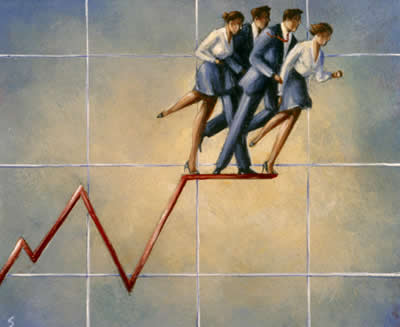|
The Difference between Winning and Losing is an Attitude of Gratitude or....
Greetings!
As I have traveled about during the last two years, I have spoken to several business owners who have gone out of business or are in the process of going out of business. One commonality among these business owners in almost every situation.... - read more below.
In this economy, it can be very tricky to find the right employee for the position you have open. If you are an employer and you are wondering how you can find that perfect employee when you get 600 applications or resumes per open position. Check out CFR's FREE REPORT. Scroll slightly down to the free report.
On the other hand, if you are a coach of clients who own a business, or if you are a business owner that is interested in helping your clients or customers who own businesses find great employees. Find out how here. Click on the link to find out how you can help them.
|
|
The Difference Between Winning and Losing is An Attitude of Gratitude While Defending what you have 
(continued from 1st paragraph above)....was the business owner failed to protect what they had. Bob
Harrison from Increase Ministries talks a lot about defending what we have. He goes on to say, they didn't play defense. They
never counted what they had. In
other words, maintaining the provision and increase we have already experienced
in our businesses. Most of the business owners I talked to failed to do just
that.
It is very easy to feel, as in an emotion when a situation is
uncertain, scary and sometimes even hopeless a certain amount of fear. But, we all have so much to be
thankful for.
It is very easy to focus on what we don't have, what we lost and what we are missing, instead of focusing on what we have and what is presently available to us.
Sometimes, in our human nature, we will dwell on things we have always had and don't have any more.
The only way to look at this and to grow as a human being is to evaluate what can we learn from
the experience or situation and ask ourself the tough question, is the season over? Sometimes, we were only meant to have something for a season and then the season is over. If that is the case, then it is time to move onto the next season.
In our Guest Editorial below, Mac Anderson talks about change. Great leaders are able to adapt to the new circumstances and use the resources available in the new situation (season) to create growth.
As a result, one of the best strategies to use in difficult times (or at any time for that matter) is to count what you have, be thankful for it, use it wisely and watch it expand.
How can what we have expand? ?
|
|
Change is Never Easy, but if you don't change, you..... This week's Guest Editorial
Change is not easy. But it is simple. Things will always
change. We don't have a choice about that, but we do have a choice on how we
react to change; and as a leader whether or not we choose to create change. The choice really boils down to this...either
we manage change, or it will manage us.
As a leader, however, deciding to make changes is the
easy part. Getting your people on board is much more difficult. Why is that?
Quite simply, change is an emotional process. We are all creatures of habit who
usually resist it, and welcome routine. Uncharted waters are scary!
In the long run, however, sameness is the fast tract to
mediocrity. And, mediocre companies won't survive. Tuli Kupferburg said it
best... "When patterns
are broken, new worlds emerge." And, that is your
challenge...to convince your team that the new world you are trying to create
is better than the one you're in. Is it easy? Of course not. It takes planning,
commitment, patience and courage.
The truth, of course, is that change can be a wonderful
gift. In fact, it is the key that unlocks the doors to growth
and excitement in any organization. And, most importantly, without it...your
competition will pass you by. A big part of success, as a leader, will be your
ability to inspire your team to get out of their comfort zones; to assure them
that even though they are on a new path, it's the right path, for the right
reasons.
|
What's New at CFR? 
CFR has introduced several new coaching programs for companies desiring to:
- Develop Strategic Plans with Executive Level Coaching. Visit Business Coaching
- Hiring and Retain STAR employees and keep them performing at high levels
- Helping companies market to the United States government and secure government contracts. Visit Government Contracting
- Helping coaches of all types to develop their business by using the Selection and Retention of STAR employees as a Resale and Coaching program.
- Writing two books, half way through with the first one, second one is started
- Developed a blog using WordPress hosted right here at BLOG
- We now have CD's for sale at introductory prices. Take a look at our five CD set on "Taking your business to the Next Level." (only $59.97) See it here at the STORE
And Much, Much, More.........
|
Changing the Paradigm on Time Management 
Would it be fair to say that people who we consider to be successful use their time wisely and are high achievers?
However, most people struggle with the issue of time management. May I be so bold as to suggest something?
Aren't we all given the same amount of time? 24 hours - correct? So, in reality, it is not so much how we manage the 24 hours, but what we put into the 24 hours. This is a breakthrough paradigm shift because when we realize that it is the choices we make that actually use up the time we have, we give ourselves the opportunity to make different choices.
Here are ten critical elements in effectively maximizing the 24 hours we all have:
1. Consider that the time you have can be controlled.
2. Allow for the most important things to be regularly scheduled. Food, exercise, time with family, friends, reading, quiet times (times to reflect and meditate)
3. Determine when you are at your best performing period ( Primary Peak Performance Period) and when is your secondary Peak Performance Period.
4. Create a list of the most important results that need to be accomplished to achieve your BHAG. Then identify the activity or activities that will produce that result. Number them according to their importance.
5. Place your most difficult, most important, highest revenue generating activity into this time period. Schedule the next highest priority item for the secondary peak performance period.
6. If you haven't finished your highest priority item and you are experiencing fatigue or lack of creativity, play the 15 minute game and switch to another less demanding task.
7. One such task we recommend is to tackle email with little chunks of time. 15 minutes on email for most people should be enough to find the most important ones and eliminate the ones you will never read anyway.
8. Avoid the email vacuum. Spend no more that 15 minutes on email during peak performing periods. Use a timer if necessary.
9. Set milestones/benchmarks to evaluate progress. This doesn't need to be an elaborate system. The basic idea is to continue to encourage yourself onward to completion.
10. Celebrate accomplishing the most important priorities.
|
|
|
|
|

Are you Ready to Hire?
If so, then there are several things to be aware of: 1. In this economy, with an unemployment rate exceeding 13 % in California and 10.5% nationwide, you will get bombarded with resumes and applications for the position you are posting. If this is the case for your business or for a business you may be aware of, check out this Free Report.
Read more
|
 |
Washington, DC Metro
Station on a cold January morning in 2007. The man with a violin played six
Bach pieces for about 45 minutes. During that time approx. 2 thousand people
went through the station, most of them on their way to work.
After 3 minutes a middle aged man noticed there was a
musician playing. He slowed his pace and stopped for a few seconds and then
hurried to meet his schedule.
4 minutes later:
The violinist received his
first dollar: a woman threw the money in the hat and, without stopping,
continued to walk.
6 minutes:
A young man leaned against
the wall to listen to him, then looked at his watch and started to walk again.
10
minutes:
A
3-year old boy stopped but his mother tugged him along hurriedly. The kid
stopped to look at the violinist again, but the mother pushed hard and the
child continued to walk, turning his head all the time. This action was
repeated by several other children. Every parent, without exception, forced
their children to move on quickly.
45
minutes:
The
musician played continuously. Only 6 people stopped and listened for a
short while. About 20 gave money, but continued to walk at their normal pace.
The man collected a total of $32.
1
hour:
He
finished playing and silence took over. No one noticed. No one applauded, nor
was there any recognition.
Findings:
No
one knew this, but the violinist was Joshua Bell, one of the greatest musicians
in the world. He played one of the most intricate pieces ever written, with a
violin worth $3.5 million dollars. Two days before Joshua Bell sold out a theater
in Boston where
the seats averaged $100.
This
is a true story. Joshua Bell playing incognito in the Metro Station was
organized by the Washington Post as part of a social experiment about
perception, taste, and people's
priorities. The questions raised: "In a common place environment, at an
inappropriate hour, do we perceive beauty? Do we stop to appreciate it? Do we
recognize talent in an unexpected context?"
One possible conclusion we could reach from this TRUE STORY is "If we don't take the time to listen to one of the best musicians playing some of the most beautiful music ever written on one of the most classic and beautiful instruments,
what else are we missing?
|
|